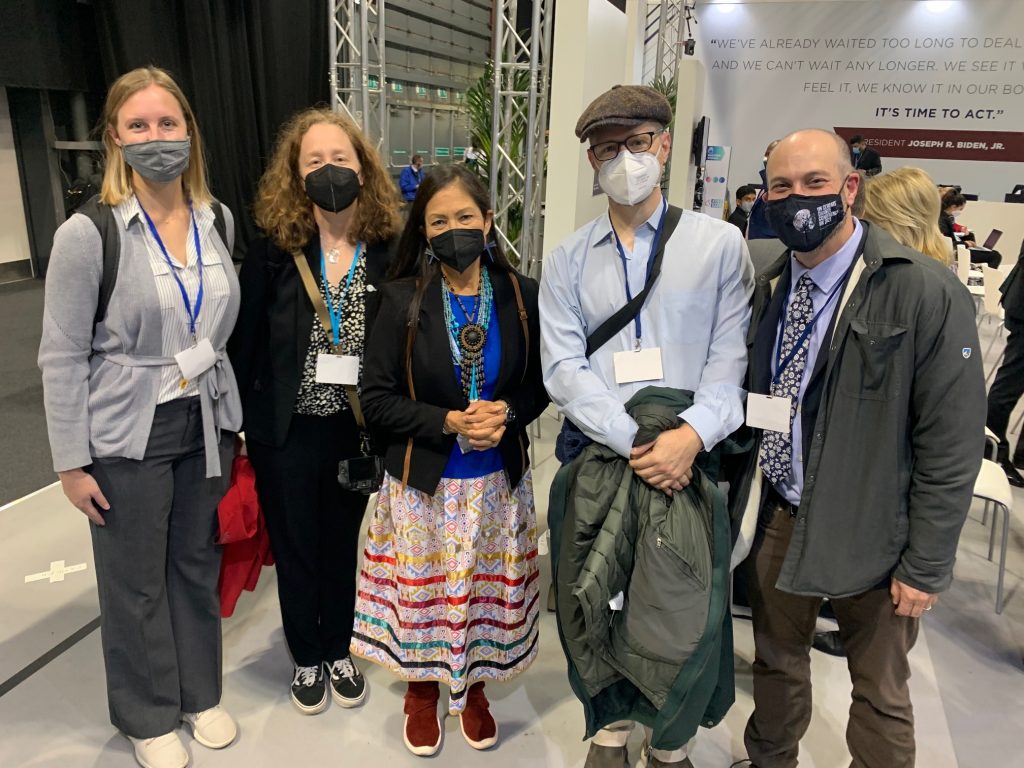
By Chloë Moore ’23
Last month, Macalester College sent a delegation of seven faculty and staff to COP 26 (Conference of Parties) conference in Glasgow, Scotland. COP 26 is the annual global climate summit organized by the United Nations, and brings together almost all the world’s countries with the goal of addressing climate change. The Macalester delegation included Environmental Studies Professors Phadke, Bradtmiller, Chatterjee, Zis, and Rogers, as well as Dean Trueblood, and the English Department’s very own Professor James Dawes, who spoke with The Words about his experiences.
Professor Dawes said of the conference that “before going… [he] was mired in climate pessimism. It was paralytic; it seemed like there was nothing [he] or anybody else could or would do…But at COP 26, [he] was surrounded by amazing people who were all laser focused on addressing climate change: scientists, artists, politicians, activists, business leaders, journalists, all of them with actionable plans of one kind or another. It was truly inspiring.”
Among the hope, Professor Dawes admits, is some discouragement. We’re not likely to keep global temperatures from rising more than 1.5oC (since preindustrial times), and that will have “catastrophic” impacts. And Dawes acknowledges that many people, especially young people, are disillusioned with the whole COP26 process in general. He said, “Greta Thunberg was ready to call COP26 a failure even before negotiations really got started because she just doesn’t believe anymore in the promises of our leaders. I get that. And the fact is, UN solutions aren’t going to be enough…But it’s also true that the work the United Nations is doing is making a difference… Maybe we can’t say it’s making us better off. But it’s definitely making us less worse off.”
That’s why one of Dawes’ current goals is “to have “ecocide” added to the list of crimes that can be prosecuted at the International Criminal Court, alongside, for instance, crimes against humanity and genocide.” Dawes “[does] research on existential risk. To this end, [he has] worked on genocide and on autonomous weapons. [He wants] to turn [his] focus now to climate change…Approached from the perspective of human rights, climate change is a grievous violation. It interferes with human flourishing on so many levels.” Dawes isn’t wearing any rose-tinted glasses when it comes to his role in stopping the climate crisis. He warned against illusions of one individual being all the difference, but also stressed that, “if I have a choice between ignoring the problem or being one billionth of those seeking a solution, I want to be that fraction.” And he said he wanted to get involved in climate work because “[he doesn’t] think [he] could live with [himself] otherwise.”
And it’s important to Dawes that he brings his humanities-centered approach to this work. “We have seen over and over again that you can produce the best scientific research possible, distribute it all over the globe, and people will ignore it. You need something more…. something that can move people in a way that scientific reports are failing to do. When Rachel Carson wrote Silent Spring, she changed the world with a story. The Silent Spring of climate change is yet to be written.” All told, while an imperfect solution, COP26 was another important piece of international climate history, and The Words congratulates Professor Dawes (and the rest of the Macalester delegation) on his participation in the conference. We look forward to seeing the continuation of his work in the area! (And some of us are very jealous that he got to meet Interior Secretary Deb Haaland).
______________________________________________________________________________
The Words thanks Professor Dawes for taking the time to answer our questions.